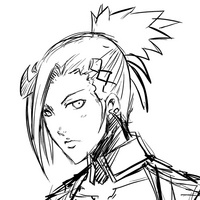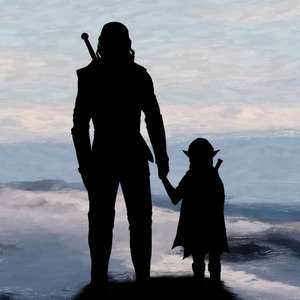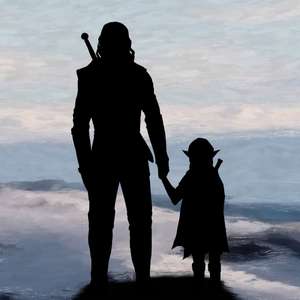More seasons came and went, and Jaris and Mara wandered the Northlands, finding neither home nor solace anywhere but the company of the other.
They made their living, as it were, in the service of the peasants, who would pay meager sums in exchange for the work of the once-noble blade of the fallen Knight and his charge, a youth whose face was always wrapped in cloth beneath the cloak of an acolyte of the Church of the Sword on pilgrimage.
Indeed, through benefit of her garb and unswaying loyalty, any who saw the two would believe them a knight errant and his loyal retainer. Or, once the girl had spoken, perhaps a most unusual father and daughter.
It was on a day swept by the first warm breaths of spring that the two travelers called upon a hamlet of goat-herds and trappers, living in rocky, tree-covered hills that lay between the lands of the Realm and those ruled by Gareth, which could not rightly be claimed by either. Word had found the Knight and his charge that this village was beset by itinerant brigands who would come each spring, after the thaw, and demand of them provisions and coin.
Having no Lord to whom to plead, the people of the hamlet had no choice but to give them all that they demanded.
This spring, as the acorn-trees blossomed, Jaris and Mara approached the forlorn hamlet with mind to bring justice to it. There, they met a crone who was the eldest among the people there, and spoke for them.
“We are much aggrieved by a band of brigands, traveling warriors. Each year they demand more of us, such that we will surely one day starve for want of goats to breed. If you could ply them with your swords and stop their thievery forever, we would give you all that we can in thanks.”
Jaris took stock of the place and the tale, and deemed the battle worthy, for he had vowed, as a Knight who had forsaken his life-oath to his Liege and committed wrongs which could not be set right, to lift his blade only and always in service of Righteousness. And so had he taught Mara, who dutifully adhered to the same code, as a faithful retainer would, though she called him father still.
“Fear not. We will put a stop to the injustice committed against you. All we ask in return is a place to keep the chill from our bones while we await their arrival, food enough to fill our bellies, and what coin you can spare to feed us in our travels when our task is done. You have little, it is plain to see, so we ask little of you.”
They were thanked greatly, and given a place beside the crone’s fire to sleep, and fed with stew of roots and nuts, with promise of a feast of meat and mead upon completion of their sworn task.
As they waited the days for the arrival of the brigands, the old woman asked, often, why Mara never took from her face the cloth that wrapped it.
“I have vowed, as an acolyte of the Church of the Sword, never to show my face among others.” It was now her custom to give this excuse wherever they traveled. Such acolytes were most rare, so few were those who questioned the tale.
“You can see, young one,” the widow would say, “that I am but an old woman with failing eyes, so my gaze is little different than none at all. And you remind me so of my daughter, who was lost with her flock so many seasons ago, that I would like you to take your cloak off, and relax fully, while you sit at my fire.”
“All the same,” the girl would say, “I shall remain as I am, for I am accustomed to it, and comfortable.”
Jaris, for his part, would sit in silence, chewing a stick of sweetroot.
At last, after may chill spring days, the brigands made their presence known through ill bearing and loud curses as the goatherds and their children cowered within their huts.
Jaris strode out, clad in mail and with sword on his back and shield on his arm, a fallen Knight, but a Knight still in proud and fearsome bearing. Mara followed close behind, in one hand the blade that once belonged to Pinion and a parrying dagger in the other and on her shoulders armor of light, ring-mailed leather claimed as trophy from a battle many springs past.
To the one among the brigands that appeared leader, Jaris addressed brashly, “We are knights errant, come to put a stop to your undue taxation of these people. You shall have but a single warning, and this is it; heed it not, and we will cut you down without further debate.”
Brigands, as any familiar with the lands protected by no Lord will be quick to tell, are a lot that takes strength in numbers and boast. Rare are the brigands that possess the wisdom to heed a warning when their opponents are less in number than their own rank, for once a brigand has shown weakness, the value of their stock-in-trade will decrease by great proportion.
Such was this case, and so it was that the brigands boasted loudly of their prowess with blade and axe and hurled curses upon Jaris and Mara.
Jaris made no further attempt to reason, but drew his blade swiftly and set at the brigands with fierceness and skill befitting a Knight who once counted himself among the finest who served the King of the Realm in the Crusades.
And Mara, without hesitation, followed suit, moving with a speed and skill that outsized her small form. Though her experience was not so great as that of Jaris, her body was quick and lithe, and her keen mind had absorbed all the warlike knowledge imparted to her.
Fear, the goatherds who watched the battle would tell, seemed to have no grasp upon the hearts of the two warriors as they battled a horde fourfold their number. Even the girl, who appeared only just of marrying age in the custom of the Realm, fought without hesitation or unease men full twice her size.
Afore long the deadly sword-dance had wrought its toll upon the brigands and all but two of their number lay dead, the balance fleeing from the hamlet in cowardice most evident, never to be seen again.
“Are you unharmed, father?” Mara asked, as was her habit after such a battle.
“Aye, Mara, and you?” he would customarily reply as he wiped the blood from his blade.
“Naught but a scratch, father,” said she.
This being one of those rare occasions on which a foe’s weapon struck true against her, Jaris looked to the girl with concern befitting a father, but not unseemly, to tend to her injury, which was an axe-cut upon her arm.
There was feasting and jubilation in the hamlet that eve, with bowls of mead poured and goat meat laid upon the spit as if it were the harvest.
Jaris and Mara partook of it in moderation, but the village elder was insistent that they stay until her wound had healed, for there was no greater insult among the Northlanders than to cast out a guest with a wound yet unmended. Were the wound to fester and death to overtake the traveler on the road, it was believed that the same misfortune would be visited upon those who had callously shunned him.
Jaris, though it was not their custom to linger long in any one place, agreed to stay until Mara’s wound was sufficiently healed. Though the girl protested the severity of the concern, she was obedient and spoke no disagreement with his wishes.











Comments (0)
See all